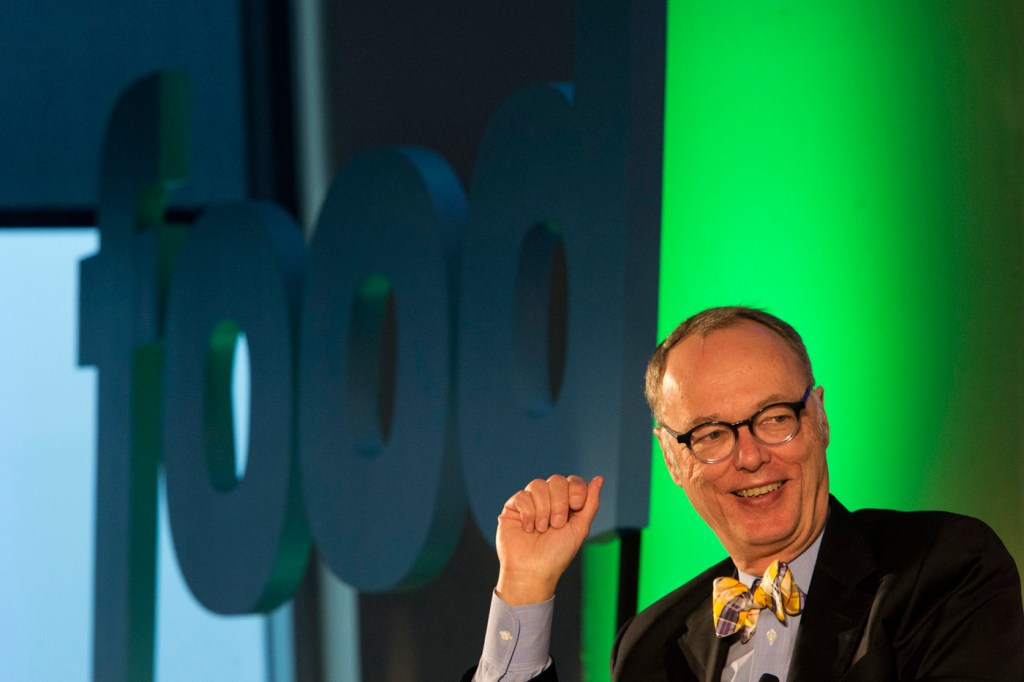‘My job is to make you not fear failure’

A night out on the town. It’s when many people take culinary adventures and feast on unique dishes that offer a variety of tastes and textures.
But there’s one person who’s working to bring those experiences directly into your kitchen: Chris Kimball, the food media mogul and creator of America’s Test Kitchen.
“There are a lot of (cooking) techniques around the world and all of those will get unhinged from their local culture and come together in different ways,” Kimball said Thursday afternoon before a capacity crowd that convened in the event space on the 17th floor of Northeastern’s East Village. “You see that in restaurants, you see that in supermarkets, but you have not seen that at home much. Home is the last place to change. There are so many ways of cooking out there that are not part of our standard American repertoire.”
Kimball’s talk marked the latest installment of Northeastern’s presidential speaker series “The Future of…,” which explores what’s on the horizon for topics that shape our lives, like food, dating, and journalism.
Tastes have gone from the melting pot concept to dishes where the individual flavors standout more.”
—Chris Kimball, creator of America’s Test Kitchen
Kimball launched his media empire in 1993 with the publication of Cook’s Illustrated, a magazine that features recipes proven to work through rigorous trial-and-error. From there he created America’s Test Kitchen, a half-hour cooking show that encourages viewers to “make bad recipes the right way.”
“My job is to figure out what you are going to do with a recipe that we create in the kitchen,” Kimball said. “My job is to make you not fear failure. Because if I can do it, you can do it. I stand there for 25 seasons of our show and I represent that audience.”
Here are some of the highlights from Kimball’s talk and his Q&A with Northeastern President Joseph E. Aoun.

Chris Kimball with Northeastern President Joseph E. Aoun during “The Future of…” Thursday afternoon. Photo by Adam Glanzman/Northeastern University
Music and food
Kimball compared following a recipe to reading music. If you understand the various components that make up a song—the key, the chords, the melodies—then you can can see what goes into making it sound the way it does. The same goes for recipes.
“Instead of just following a recipe, if you can read a recipe in terms of what is going on, you get to be a really good cook,” Kimball said. “Then you get to understand how to improvise in the kitchen by yourself.”
Sample your cooking
When asked by Aoun how one can become a better cook, Kimball said people should take small steps, such as tasting their dish before they serve it.
“Most people don’t (taste),” Kimball said. “If you just do that your cooking will improve 50 percent. Most people just make the recipes, they don’t even taste it, and serve it.”
Different tastes
Aoun also asked Kimball what is driving changes in the way people want their dishes to taste. Kimball responded by noting that most cultures are preparing dishes in a way that each taste and flavor is more prominent.
“Tastes have gone from the melting pot concept to dishes where the individual flavors standout more,” he explained. “So you get a lot more contrast, textural changes, and flavor changes.”
Following the Q&A, Kimball, Aoun, and event attendees feasted on empanadas made by campus executive chef Tom Barton and his culinary team at Northeastern Dining. But these weren’t your traditional empanadas. These contained fillings such as Bon Mei, gyros ingredients, and Northeastern’s famous macaroni and cheese.
The hors d’oeuvers and other foods were served during a reception that showcased student and alumni food entrepreneurs, such as 88 acres, which creates healthy snacks that are free of common food allergens, and Mealtime, a free app that helps people shop with meals in mind, not ingredients.
The next “The Future of…” event will take place on March 31 and feature Washington Post editor Marty Baron.





